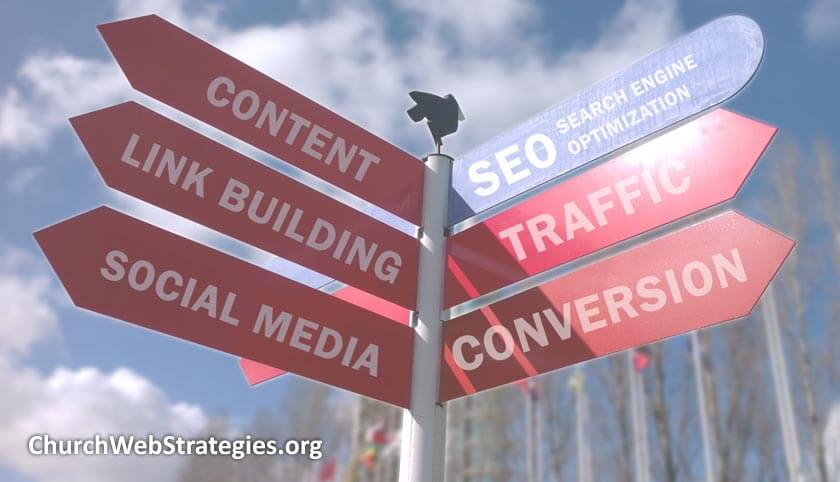In a previous article I talked about SEO for your church website. Well it is a year later and I think I need to re-visit the topic. Mostly because every church I have ever talked to wants to rank high in Google’s search results. Being in the first few results greatly increases your chances of getting a new visitor to your site. However, when you looked into hiring a search engine optimization (SEO) consultant, your church treasurer probably fainted. These sorcerers of search are not cheap. So I will try to help explain some basics that you can do yourself at the expense of only your time.
Please, keep reading. Even if you do not consider yourself a web geek that can “interface with a database in cyberspace”, this article is for you. Even as a pastor or an interested congregation member, I feel you should understand why pages and sites rank well. Below I will hit the high points with only a paragraph of summary. I promise not to lead you down a rabbit hole of technical jargon.
Keywords
In a world of 1’s and 0’s, data that a computer can easily interpret matters. The most prominent of that data is text. If you use certain words more often on your site, the search engine is going to assume that your content is focused around those words and topics. My site has “church” “web” and “strategies” used regularly and often, thus I rank well for that combination of search terms. So think about the words you want to rank for. Is it your church name? How about a particular ministry you are promoting? Whatever it is, try to use those words as often as possible without sounding like you are trying to game the system. As a general rule of thumb, if it is awkward to say out loud, you are probably overdoing it. For more ideas, check out my article on synonyms.
Prominence
When you want to understand what a text book is about, what is the first thing you look at? The title. Second, you might look at the table of contents. Thirdly, you might look at individual sections within the chapters. This is very similar to how search engines look at your website. Not only does it need to know what words you are using, but also what are the most important words you are using. This means creating relevant page titles, and a logical structure of headings to break apart your text. By adding structure, you tell the search engine what you think are the most important words and phrases.
Links
Search engines consider links to a website to be an indicator of how good it is. If a prominent site links to you, their popularity transfers to your site. As your church website becomes more widely known, local yellow pages sites and city guides will start linking to you and bolstering your prominence. If your church is featured on the local news, be sure to try and get a link from their site to yours. The more legitimate links you can have coming in to your site, the better you will rank for those broader search terms; such as “churches in (your city name)”
Social Media
Having a presence on social media is not only good for helping to spread the word, but also for boosting your SEO rankings. This is especially true if you are active on Google’s own social media platform, Google+. Here, getting a “+1” (similar to a Like on Facebook or a retweet on Twitter) will further boost your rankings. You might notice that if you search on Google for “Church Web Strategies”, the Google+ profile for this site displays at the bottom of the page. Although this is not the same as being in the #1 spot, it is an easy way for a small operation like this blog to get visibility.
Action Item
As I said, this is not a fully comprehensive article on SEO. Others like SEOMoz and even Google themselves have a lot more to say on this. I highly encourage you to have your web team (be it multiple people or your church secretary) to jump further in. You can usually accomplish the basics of SEO on your own. However, your rankings will not improve at all if you do not examine your site and see where some of these changes can be made to your content, HTML structure, and social media policies.
Photo courtesy of Luis Osorio

